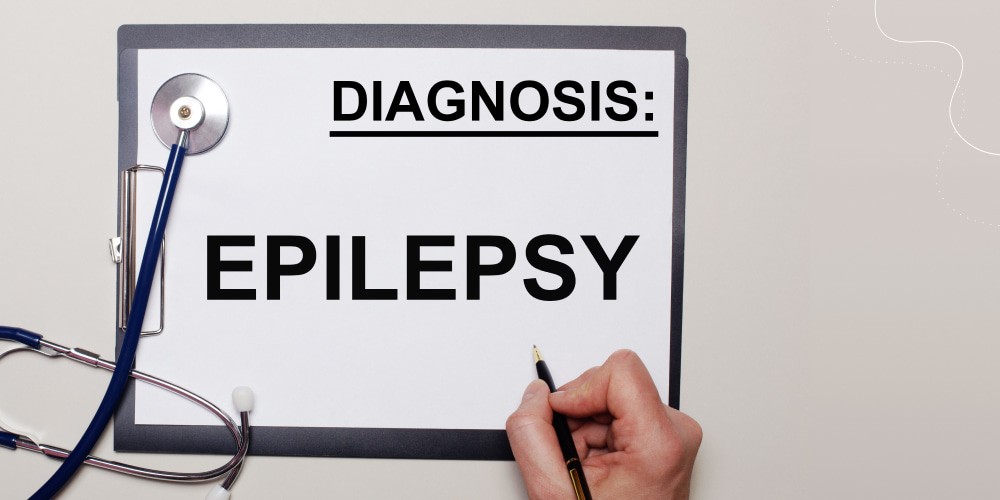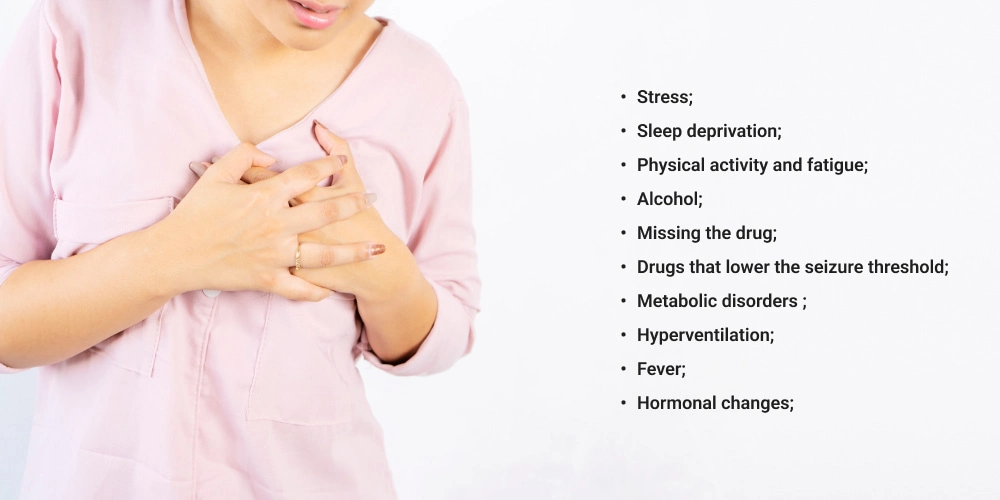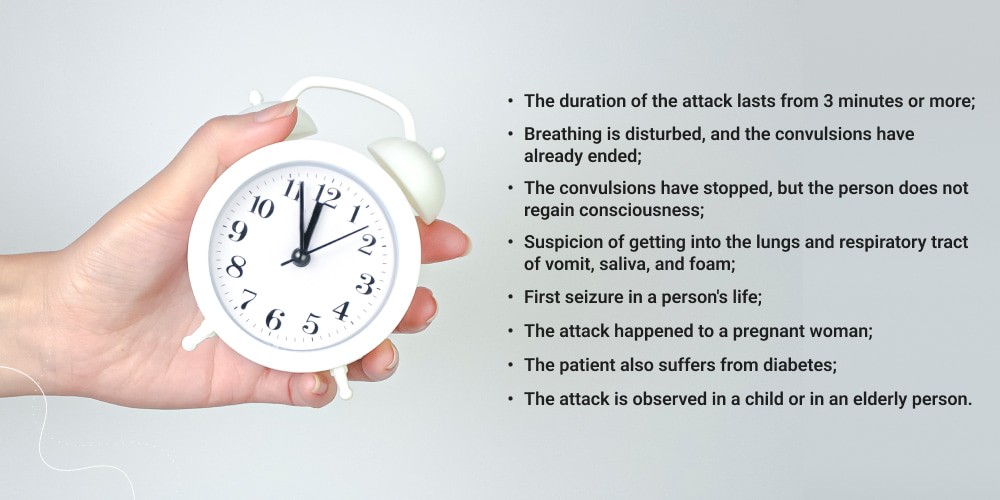Epilepsy is a heterogeneous group of disorders characterized by recurrent, spontaneous seizures. The main symptom of epilepsy is epileptic seizures. What causes seizures? An epileptic seizure occurs due to disturbances in the processes of excitation and inhibition in the cerebral cortex cells. Epilepsy is polygenic. Genetic factors have an essential role in their genesis. They include pre-and perinatal lesions of the nervous system, degenerative diseases of the central nervous system, brain tumors, traumatic brain injuries, and vascular diseases of the brain.
Epilepsy is one of the most common diseases among the chronic pathology of the nervous system. According to statistics, epilepsy occurs with the same frequency throughout the world.
Regardless of race, about 0.5 – 1% of the population suffers from this disease. The frequency of epilepsy in the child population is 0.5-0.75%, and febrile seizures – are up to 5%. The disease has a significant negative impact on development and significantly limits the possibilities of rehabilitation therapy. The child with epilepsy needs rehabilitation in the motor and psycho-speech areas.
What does epilepsy mean?
Epilepsy is a chronic brain disease characterized by repeated spontaneous seizures (paroxysms) that result from excessive neuronal discharges. Clinically, epilepsy is manifested by convulsions and changes in consciousness (up to its loss). Epilepsy can be either an independent disease or a symptom of another pathology.
- According to WHO, approximately one in 4-10 people out of 1000 worldwide have active epilepsy – this is one of the most common neurological diseases.
- The basis for the development of seizures in epilepsy is an imbalance in the brain’s two systems – excitatory and inhibitory. Usually, these systems work simultaneously, creating an optimal level of neuronal activity.
- It is observed as an increase in excitatory activity with a lack of inhibitory activity. As a result, this leads to the fact that entire groups of nerve cells begin to produce electrical discharges of high power synchronously. These discharges can spread to other parts of the nervous system, leading to an attack.
- People with epilepsy are more likely to get bruises and fractures associated with seizures. They are also more likely to have anxiety disorders and depression. In addition, patients with epilepsy have an increased risk of premature death from falls, drowning, and burns.
In reflex epilepsy (a rare condition), seizures develop in response to an external stimulus, such as repeated sounds, flashes of light, video games, music, or even touching body parts.
The disease is a serious social problem. The lack of information about epilepsy contributes to misunderstanding, fear of symptoms, and discrimination against patients.
How is epilepsy diagnosed?
Examination of a patient with suspected epilepsy symptoms includes the following methods: a collection of complaints and anamnesis, neurological analysis, EEG (electroencephalography), MRI of the brain, angiography of the head vessels, and other tests.
Epilepsy is diagnosed and treated by neurologists. Some of them specifically expand their qualifications in this direction, which allows them to act even more effectively.
Let’s look at the diagnosis in more detail:
- collection of complaints and anamnesis: the doctor asks the patient in detail about the symptoms that disturb him and finds out the time and circumstances of their occurrence; a characteristic sign of epilepsy is the appearance of seizures against the background of sudden sounds, bright or flashing lights, etc.; special attention is paid to heredity, past injuries and diseases, the patient’s lifestyle and bad habits;
- neurological examination: the doctor evaluates muscle strength, skin sensitivity, severity, and symmetrical reflexes;
- EEG (electroencephalography): a procedure for recording the electrical activity of the brain, which allows you to see the characteristic action of an epileptogenic focus; if necessary, the doctor may try to provoke overexcitation with flashes of light or rhythmic sounds;
- MRI of the brain: makes it possible to identify pathological areas and formations: tumors, ischemic foci, consequences of a stroke, etc.;
- angiography of the vessels of the head: the introduction of a contrast agent into the blood, followed by radiography; allows you to see areas of vasoconstriction and deterioration of blood flow;
- ultrasound of the brain (Echo-encephalogram): used in children in the first year of life who have not yet closed the fontanel; visualizes tumors and other volumetric formations, accumulation of fluid, etc.;
- rheoencephalography: measurement of the electrical resistance of the tissues of the head, which can be used to diagnose blood flow disorders;
- general examinations: general blood and urine tests, blood biochemistry, tests for infections, ECG, etc. for a comprehensive assessment of the patient’s condition;
- consultations of narrow specialists: neurosurgeon, toxicologist, narcologist, psychiatrist, etc. (prescribed depending on the alleged cause of seizures).
The list of examinations may vary depending on the patient’s age, the type of seizures, the presence of chronic pathologies, and other factors.
What causes epileptic seizures in children?
The main causes of epilepsy in children are:
- Heredity;
- Hypoxia at the stage of intrauterine development;
- Neoplasms of the brain;
- Previousneuroinfection (meningitis, encephalitis, etc.);
- Childbirth with complications (cord entanglement, forceps delivery);
- Deficiency of magnesium and zinc;
- Head injury.
In significant terms, episyndromes are episodes of temporary loss of control over consciousness and movements. At the same time, the classic symptoms – convulsions and convulsions – are rare and are not characteristic of an attack that has begun.The disease has different forms of manifestation and implements various functions.
The first symptoms of the disease may appear in the first year of life. Diagnosis of infants during this period is complicated by the fact that the warning signs of the disease can be confused with the usual chaotic movements of babies or individual behavioral patterns. The variation in symptoms in young children is very considerable, and therefore it is not possible to say with certainty how the disease begins.
The following features should be the reason for contacting a doctor:
- The children scream and shudder at the same time.
- They can pull arms and legs spontaneously and chaotically.
- They focus suddenly on one point, and do not respond to stimuli.
- They are noticed spontaneous facial muscles contraction and then the limbs.
What causes seizures in adults?
Many epileptic seizures begin with an aura. It is the name of the complex of specific sensations that occurs shortly before the seizure. Aura manifestations can be completely different: paresthesia (pathological sensations), a specific taste, auditory, visual or olfactory hallucinations, etc.
The most commonly described seizure provocateurs are the following.
-
Stress
According to different sources, emotional stress is the most common trigger for seizures (30% to 66%). Relaxation (exercises) is often used to prevent or reduce the severity of attacks.
-
Sleep deprivation
Deprivation of sleep is the second most frequent provocateur of seizures. It often accompanies hyperactivity, stress, alcohol, and stimulants. Sudden awakening is the main provoker of seizures in juvenile myoclonic epilepsy, and forced awakening is more “dangerous” than spontaneous.
-
Physical activity and fatigue
A blood pH decrease (metabolic acidosis) is associated with the appearance of epileptiform activity on the EEG during and after exercise. Exercise-induced seizures usually occur after they stop. The risk of an attack after prolonged physical activity is significantly higher than after individual physical exercises are interrupted by rest. Prolonged hypoxia or hypoglycemia after prolonged physical exertion may also contribute to seizures.
-
Alcohol
Drinking alcohol is often associated with missed medications and sleep deprivation. Attacks usually occur during a period of a sharp drop in the concentration of alcohol in the blood, especially when a lack of sleep accompanies its excessive use.
-
Missing the drug
Missing one or two doses rarely causes seizures. At the same time, if patients decide that they are cured and stop taking the medication, the risk of attacks becomes very high. Seizures due to discontinuation of the drug are especially characteristic of the abrupt withdrawal of barbiturates and benzodiazepines, and can also be observed in people without epilepsy.
-
Metabolic disorders
They can result from diarrhea, constipation, acute infectious diseases, liver and kidney failure, and diuretics. Hyper- or hyponatremia, hypokalemia, and hypoglycemia may precipitate seizures in patients with or without epilepsy. In diabetic patients, attacks often occur due to an overdose of insulin or sulfa drugs, as well as against the background of hypoglycemia due to the intake of large amounts of food.
-
Hyperventilation
Excessive breathing unrelated to exercise can trigger seizures in some patients. Unintentional hyperventilation may be due to anxiety, sobbing, or sexual activity in daily life.
-
Fever
An acute infection accompanied by an increase in body temperature can cause seizures in patients of any age.
-
Hormonal changes
From 10% to 70% of women note the connection of seizures with the menstrual cycle. The main reason for the increase in seizures during this period is a violation of the drug regimen. Pregnancy itself has little effect on the frequency of seizures.
How long do seizures last?
In most people, epileptic seizures last from 1-5 minutes to a few seconds. Short single seizures are relatively safe and stop on their own. In some cases, attacks can be repeated one after another. If the patient regains consciousness between epileptic episodes, such seizures are called serial.
Suppose in the interval between attacks, consciousness is not restored, and the duration of each attack is at least 5+ minutes. In that case, this course is called “status epilepticus.” Status epilepticus is a life-threatening condition due to the possibility of cerebral edema.
It is strictly necessary to call an ambulance if:
- The duration of the attack lasts from 3 minutes or more.
- Breathing is disturbed, and the convulsions have already ended.
- The convulsions have stopped, but the person does not regain consciousness.
- Suspicion of getting into the lungs and respiratory tract of vomit, saliva, and foam.
- First seizure in a person’s life.
- The attack happened to a pregnant woman.
- The patient also has diabetes.
- The attack is observed in a child or an older person.
How many seizures can you have in a day?
Seizures vary from patient to patient: from one to several a day. Do all people who have seizures have epilepsy? One seizure is not indicative of epilepsy (up to 10% of people worldwide experience one seizure in their lifetime).
- Epilepsy attacks may occur with or without loss of consciousness. During an attack, we can see convulsive twitching of muscles, feel various sensations in the body, influx of thoughts, and experience vivid and not always understandable emotions. In addition, different ages have their characteristics of the occurrence and course of epilepsy.
- The main mechanism for the appearance of seizures is the synchronization of the work of all nerve cells in a particular area. It is called an epileptogenic focus and determines the symptoms and their severity. Contrary to popular belief, the disease is not limited to convulsions with loss of consciousness. There are many types of seizures with a variety of symptoms, depending on the area of the brain in which the pathological focus occurs. All of this affects the number of attacks.
Bottom Line
Epilepsy is a chronic disease. But incurability is one of the main myths about it. In 75% of patients, epilepsy is well controlled. We can achieve the absence of attacks and bring the disease to remission. Only 30% of patients do not respond to drug treatment. But we can free 10% of patients from seizures. And that’s a pretty significant percentage.
It is crucial to seek treatment from an experienced Lone Star neurologist as early as possible. It will help you fight the disease as soon as possible.

















Please, leave your review
Write a comment: